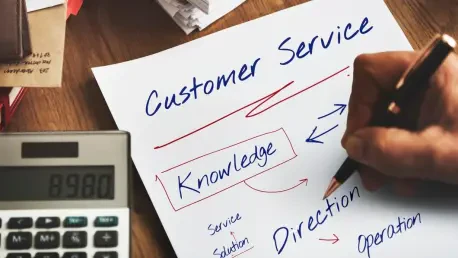In today’s rapidly evolving business landscape, delivering exceptional customer experience (CX) while scaling operations remains a significant challenge for companies of all sizes, and Ty Givens, the Founder and CEO of CX Collective, brings a wealth of knowledge to this complex issue. Drawing from her work with startups and Fortune 500 giants alike, Ty shared her insights in a recent episode of the Punk CX podcast, revealing a refreshing approach to building customer service systems that grow without sacrificing the genuine, human connection customers value. Rather than relying on superficial charm or quick technological fixes, Ty advocates for a foundation rooted in proactive strategies and structured operations. Her perspective challenges long-held assumptions, pushing leaders to rethink how they manage growth in support teams. This discussion sets the stage for a deeper exploration of how authenticity and scalability can coexist in customer service, offering practical takeaways for businesses aiming to balance efficiency with heartfelt engagement.
Overcoming Common Misconceptions in Customer Service Growth
Debunking the Myth of Niceness as a Strategy
One of the most pervasive misunderstandings in customer service is the belief that simply being “nice” or leaning on a particularly likable team member can sustain a positive experience as a company grows. Ty Givens points out that this mindset is a recipe for failure when scaling, as it lacks the operational framework needed to handle increased demand. Without a solid structure, even the most charismatic individuals struggle to maintain consistency under the pressures of expansion. The complexities of managing larger teams often introduce unforeseen challenges, such as heightened emotional labor for leaders, which can erode confidence and disrupt interactions with frontline staff. This dynamic reveals a critical need for systems that prioritize repeatability and reliability over personal charm, ensuring that customer interactions remain high-quality regardless of team size or individual personalities. A shift toward proactive planning becomes essential to navigate these hurdles effectively.
Addressing Emotional Toll on Leadership
Beyond operational gaps, the emotional burden on customer service leaders during periods of growth often goes unnoticed until burnout sets in. Ty Givens emphasizes that this strain can manifest as self-doubt, impacting how leaders guide their teams through challenges. To combat this, a focus on self-care and deliberate time management is vital, allowing space for strategic thinking rather than constant firefighting. Leaders must balance the immediate demands of delivering results with a broader understanding of the business ecosystem, ensuring they don’t lose sight of long-term goals. By carving out dedicated moments for reflection and planning, they can mitigate the risk of exhaustion and maintain a clear perspective. This approach not only safeguards individual well-being but also fosters a healthier team dynamic, as emotionally grounded leaders are better equipped to inspire and support their staff through the ups and downs of scaling operations.
Building Sustainable Systems for Scalable Support
Prioritizing Process Over Technology
A common pitfall in scaling customer service is the rush to adopt tools like AI as a catch-all solution, often without addressing deeper flaws in existing workflows. Ty Givens cautions that technology can amplify problems if the underlying processes and policies are not sound. Before integrating any digital tools, a thorough evaluation of operations is necessary to establish a robust foundation that can withstand growth. Drawing inspiration from Adrian McDermott of Zendesk, who likened AI to a transformative industrial shift fueled by knowledge, Ty suggests that technology should serve as a supportive element rather than the driving force. This means leveraging AI to enhance team capabilities, not to replace the critical thinking required to refine customer interactions. By focusing on process improvement first, companies can ensure that any tech adoption aligns with their goals, ultimately creating a seamless experience for both employees and customers.
Fostering Resilience Through Thoughtful Integration
While technology holds immense potential, its integration must be approached with caution to avoid disrupting the human element of customer service. Ty Givens stresses that tools should never overshadow the importance of well-designed systems that prioritize clarity and efficiency. For instance, automating repetitive tasks can free up staff to focus on complex issues, but only if the automation is built on a framework of streamlined policies. Without this groundwork, even the most advanced solutions risk creating confusion or inefficiency. A balanced strategy involves continuous assessment of how technology impacts team dynamics and customer satisfaction, ensuring it complements rather than complicates operations. This mindful approach helps maintain authenticity in interactions, as it keeps the focus on solving real customer needs rather than chasing tech trends. Companies that master this balance are better positioned to scale sustainably while preserving trust and connection.
Empowering Teams for Long-Term Success
Reallocating Resources for Better ROI
Financial constraints often limit the ability to expand customer service teams, but Ty Givens offers a practical alternative by advocating for the strategic reallocation of existing resources. Instead of focusing solely on increasing headcount, businesses can identify team members with unique skills—such as expertise in data analysis or a talent for mentoring—and assign them to roles like workforce management or training. While this shift might not immediately boost metrics like ticket resolution rates, it can significantly reduce ticket volume over time through improved planning and skill development. This method reflects a forward-thinking mindset, prioritizing long-term value over short-term gains. By investing in roles that enhance operational efficiency, companies can achieve a higher return on investment, ensuring that limited resources are used in ways that drive meaningful impact across the organization.
Linking Employee and Customer Experience
Central to Ty Givens’ philosophy is the undeniable connection between employee satisfaction and customer outcomes. When frontline staff feel heard and valued, their engagement translates directly into better service quality. Leaders are encouraged to approach employee feedback with genuine openness, setting aside assumptions to truly understand team needs. This collaborative environment fosters a sense of ownership, transforming staff into passionate advocates who champion both the company’s mission and its customers. Such empowerment not only boosts morale but also ensures that processes are shaped by real-world insights from those closest to the customer. The ripple effect is profound, as motivated employees deliver interactions that feel authentic and tailored, reinforcing customer loyalty. This synergy between internal culture and external experience becomes a cornerstone of scalable service that doesn’t lose its personal touch.
Reflecting on Innovative Models and Future Steps
Learning from Unconventional Approaches
Looking back, Ty Givens highlighted an unexpected example of effective customer service during her Punk CX podcast discussion, pointing to Amazon as a brand that redefined authenticity. Unlike traditional models that emphasize warmth and accessibility, Amazon adopted a no-nonsense, efficiency-driven approach. While reaching them could be difficult, their focus on swift, effective resolutions once contact was made stood out as a powerful lesson. This perspective challenged conventional thinking, showing that genuine service could prioritize results over excessive friendliness. Reflecting on this, it became clear that authenticity in customer experience could take many forms, tailored to a company’s unique strengths and customer expectations. This insight encouraged a broader view of what scaling with integrity could look like, inspiring leaders to rethink their own strategies.
Charting a Path Forward with Intentional Growth
As the conversation with Ty Givens unfolded, actionable takeaways emerged for businesses eager to scale without losing their core values. Moving forward, leaders should focus on embedding proactive systems that withstand growth pressures, ensuring emotional well-being is prioritized through structured self-care practices for teams. A critical next step involves reevaluating resource allocation to maximize impact, while continuously refining processes before layering on technology. Engaging employees as active contributors to operational design remains essential, fostering an environment where their insights shape customer interactions. Additionally, maintaining transparent communication with executive leadership can help align expectations and secure vital support. By adopting these strategies, companies can build resilient customer service frameworks that preserve authenticity, setting a strong foundation for future innovation and connection in an ever-changing landscape.









